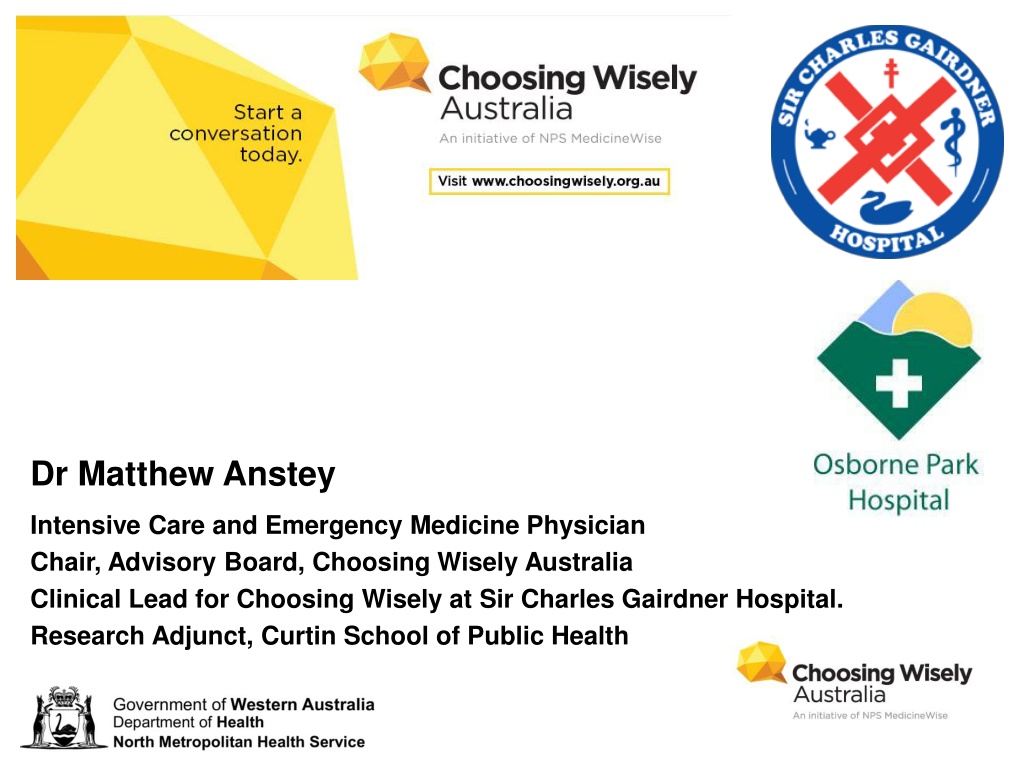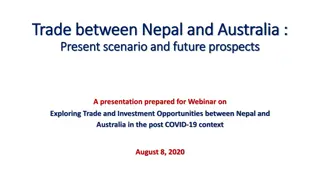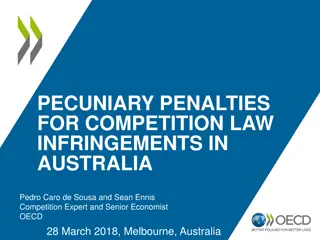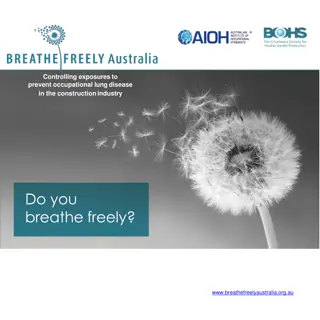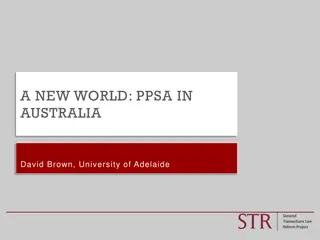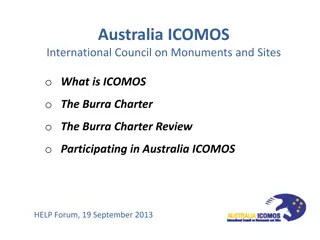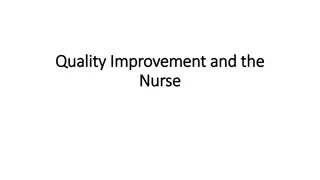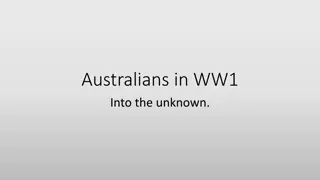Dr. Matthew Anstey: Leading Choosing Wisely in Australia
Dr. Matthew Anstey, an expert in Intensive Care and Emergency Medicine, chairs the Advisory Board for Choosing Wisely Australia. He emphasizes the importance of value in healthcare to avoid unnecessary tests and procedures. Choosing Wisely Australia aims to initiate conversations about beneficial healthcare practices and prevent harmful interventions. Dr. Anstey advocates for medical professionalism and social justice in healthcare systems.
- Dr. Matthew Anstey
- Choosing Wisely Australia
- Healthcare Value
- Medical Professionalism
- Healthcare System
Download Presentation

Please find below an Image/Link to download the presentation.
The content on the website is provided AS IS for your information and personal use only. It may not be sold, licensed, or shared on other websites without obtaining consent from the author. Download presentation by click this link. If you encounter any issues during the download, it is possible that the publisher has removed the file from their server.
E N D
Presentation Transcript
Dr Matthew Anstey Intensive Care and Emergency Medicine Physician Chair, Advisory Board, Choosing Wisely Australia Clinical Lead for Choosing Wisely at Sir Charles Gairdner Hospital. Research Adjunct, Curtin School of Public Health
VALUE VALUE will decrease if: Costs increase and don t change outcome = unnecessary tests/procedures Value will decrease even more if test/procedure worsens outcome (non-evidence based)
Medical professionalism In 2002, ABIM wrote Medical Professionalism in the New Millenium, A Physician Charter . It includes the fundamental principle of social justice: The medical profession must promote justice in the health care system, including the fair distribution of health care resources.
Have you heard of Choosing Wisely Australia? Yes No
CHOOSING WISELY AUSTRALIA Starting a national conversation about tests, treatments and procedures that provide no benefit and in some cases may cause harm Focused on high quality care, supporting conversations between the consumer and clinician Based on the best available evidence and what care is truly needed Part of a global movement to assess low value care
THE ISSUES Not all tests add value Can expose the consumer to undue risk of harm and cost Consumers are often unaware Many tests have become ingrained in the system routine panel
THE ISSUES Consumer expectations: more is better Pressure on clinicians to cover all clinical possibilities 30% expenditure in the US considered wasteful Hospital pressures for throughput Less reliance on clinical skills and time, more reliance on technology
Currently participating colleges/societies Australasian Chapter of Palliative Medicine Australasian College of Emergency Medicine Australasian Society for Infectious Diseases Australasian Society of Clinical Immunology and Allergy Australian and New Zealand Intensive Care Society Australian College of Nursing Endocrine Society of Australia Haematology Society of Australia and New Zealand Royal Australasian College of Surgeons Australasian College of Dermatologists Australian Physiotherapy Association Royal Australian and New Zealand College of Ophthalmologists Royal Australian and New Zealand College of Radiologists Royal Australian College of General Practitioners Royal College of Pathologists Society of Hospital Pharmacists Royal Australasian College of Physicians (EVOLVE) And more coming .
LIST DEVELOPMENT Lists and recommendations are developed and owned by the colleges and societies List development criteria: Tests and treatments misused or over used or carry significant cost Items within the speciality's purview and control Evidence based Transparent process
REACHING CONSUMERS Supporting both consumers and clinicians to have conversations about appropriate care Consumer resources for website Engaging with consumer organisations
Adaptation of Choosing Wisely What elements of the campaign are relevant to your organisation? Cost? Volume? Patient risk? Could they be measured? How do they align with other programs (national standards, clinical standards, ABF)? Could you change physician or patient behaviour? 13
Factors to consider in choosing an item to focus on 1. Consider items according to structured algorithm. ITEM Volume (low/high use) Unit cost Patient safety benefit Ability to measure Ability to change behaviour 2. Alignment with other initiatives (National Standards or accreditation)
Current Champion hospitals include - Sir Charles Gairdner Hospital - Royal Brisbane - Gold Coast - Austin - Monash - Eastern Health - Royal Perth - Fiona Stanley Hospital
How to make it happen 1. Successful pilot projects 2. Deciding what to focus on 3. Choosing Wisely Champion Hospital 4. The elements that make it work & sustainability. Clinical champion & workflow. 5. Don t forget your business case
De-escalating PPIs in 5 WA ICUs Work under preparation for publication. Not for wider dissemination Stress ulcer prophylaxis a common prescription in critically ill patients. First part of study looked at appropriateness of prescribing and efficacy of stopping on discharge.
Second part involved: education guideline for prescribing staff, pharmacist responsibility , and re-measurement. Results: 1. Patients pre 531 post 396 Prescribed stress ulcer prophylaxis - major risk factor (1+) - minor risk factor (1+) - no risk factors 98/153 (64.1%) 154/212 (72.6%) 0.051 44/212 (20.8%) 45/153 (29.4%) 0.500 43/212 (20.3%) 39/153 (25.5%) 0.123
Pre Post p-value Number patients commenced on SUP1 Patients commenced on SUP who were discharged on it without an indication Not previously on SUP and prescribed SUP without any risk factors 184 143 78 (42.4%) 11 (7.7%) < 0.001 40/314 (12.7) 39/277 (14.1) 0.990
Reasons? Influencing prescribing of doctors is not easy when they change regularly..may not be a priority for them Giving pharmacists the responsibility seems to be the key.
Bye Bye PPI @ SCGH Recommendation from Choosing Wisely Australia Don t use Proton Pump Inhibitors (PPI s) long term in patients with uncomplicated disease without regular attempts at reducing dose or ceasing. Reasons to tackle: High volume, low incidence of but significant potential for harm (pneumonia, c. difficile, osteoporosis, dementia, nephritis). Trial of de-prescribing.
Project Implementation PPI Identified high use areas Pre- implementation audit Development of deprescribing algorithm Education to medical, pharmacy and nursing staff ALTERED electronic discharge summary to require therapy plan if PPI on discharge. Post-implementation audit RESULTS: PPI indication provided on D/C summary increased from 27 -> 38%. Comments to GPs increased from 0 -> 18%. Attempts to de-prescribe remained low (8%).
Reflections Involving junior medical staff in data collection/projects This is a positive project Need project officer Need clinicians on the floor willing to get involved Measure in whatever way you can (manual, finance, activity) Part of movement : MBS review, Atlas of Variation
matthew.anstey@health.wa.gov.au Thanks to Megan Hart, Chantal Ferguson, Damien Wallman and others.
